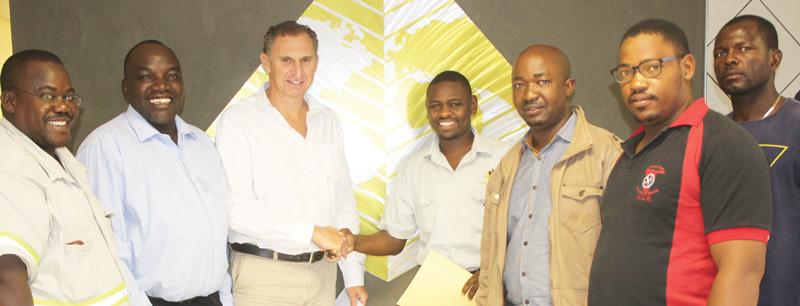
Former Wimpy owner alleges all smells not well in the fast food kitchen

A disillusioned former Wimpy owner is running the gauntlet for other franchise owners, alleging that the franchise structure in Namibia is intrusive and detrimental to the profitability of each outlet.
Chris van der Merwe has spent several years accumulating documentation to support his claim that management of the so-called Marketing Fund, to which all Wimpy franchise owners contribute monthly, is subject to gross irregularities, and that the funds are not employed solely to promote the Wimpy brand in Namibia.
During his protracted investigations, van der Merwe unearthed several elements of what he described as misappropriation, or in some instances, as fraudulent and criminal. He has put together a collection of bank statements, contracts and minutes of meetings, all shown to the Economist, which he claims prove that the Marketing Fund is not used for what it is contractually designed to do – solely to promote the interests of the Wimpy brand in Namibia.
The Wimpy brand is owned by the JSE-listed group, Famous Brands who controls 27 brands worldwide. Six of these brands operate in Namibia – Mug&Bean, Steers, Wimpy, Debonnairs, Fish Away and Milky Lane. A seventh brand, Wakaberry, has ceased operations in 2018.
Van der Merwe is no stranger to operating a Wimpy. He first became a franchisee in 1994 in South Africa. In 2005 he relocated to his native country, Namibia, and obtained the Wimpy franchises in Wernhil and Maerua shopping malls in Windhoek. He owned the Wernhil Wimpy until 2008 and the Maerua Wimpy until 2016.
During his time as a Namibian Wimpy owner, van der Merwe was elected to a body called the Marketing Council. His tenure in this oversight body, alerted him to a number of inconsistencies which could not be explained from normal business operations. In this capacity, he was a co-signatory of the Marketing Fund, a position he claims was never dissolved while he was still a franchisee.
Famous Brands’ Managing Director, Mr Darren Hele disputes this saying “Mr Van der Merwe is also not legally entitled to involve himself with the Wimpy marketing fund; he was involved purely through a voluntary body that we call the Wimpy National Franchise forum which is an informal body set up to assist to facilitate better marketing-related decisions between the franchisor and franchisee.”
According to the agreement between the Wimpy group and its Master Licensee, the Marketing Fund must be used solely for the purpose of promoting the Wimpy brand through marketing and advertising to ensure an adequate clientèle for every individual outlet. Van der Merwe alleges this is not the case, showing several bank statements and reconciliations in his possession to prove his claims.
Eventually, it transpired that currently four different bank accounts are used to receive the franchisees’ regular marketing contributions. Van der Merwe said he was able to track these four accounts and obtain statements for all. From the statements, he quickly picked up that the number of deposits into the Marketing Fund did not match the number of payments made by franchisees. According to Van der Merwe there should have been a set number of monthly contributions from the number of franchisees, a number which is known, but this was not the case.
“Even if I reconciled all the statements for the four accounts I could detect, I found only 29 payments (at the most) and there should have been 52, counting all outlets for the six brands in the Famous Brands group,” he said adding that this discrepancy was what made him suspect in the first place that there are more than one account.
The Marketing Fund and its appropriation is determined and controlled by a Memorandum of Agreement between the franchisor, Famous Brands, and their Namibian representative, the Master Licensee. This fund is separate to the Royalty Fund to which all franchisees must also contribute and which is used to pay the Master Licensee.
“It is very clearly stated in the Memorandum of Agreement that the Marketing Fund must be used “solely” for advertising and marketing the Wimpy brand,” van der Merwe stressed.
But on the issue of how the fund is managed, Hele said “The Wimpy Namibian Marketing fund is not managed in the same way as the South African Wimpy marketing fund nor has it been historically.”
“This is not unusual as each territory we operate in has different requirements, however the principles are similar in that broadly speaking, it is a ring-fenced fund used in a transparent manner for the collective benefit of the franchisees that are represented in that market,” Hele added.
“For the Namibian Marketing Fund there are at least four Nedbank accounts, Newco Marketing, Newco Marketing Casual Dinner, Newco QSR and Newco Casual Dining,” said van der Merwe, alleging that the Namibian Master Licensee used funds from these four accounts to settle some of its own business expenses and to pay for hotel accommodation in South Africa, amongst others.
“The Master Licensee took more than N$2,5 million out of the Marketing Fund across all four bank accounts from the second half of 2015 over a period of 34 months, contributed to by the 50+ franchisees of the six brands in the Famous Brands stable operating across Namibia,” he said.
In terms of the operational side of Wimpy restaurants, van der Merwe also noticed another disturbing trend.
“Seven Wimpys closed down in eight years, with more than 120 jobs lost, because of two reasons. First, the little marketing and advertising done by the Master Licensee does not reflect the full income accrued in the Marketing Fund, and second, the financial ratios are out of line as measured against the margins as communicated by the Master Licensee,” he said.
“For instance, what we call Food Cost must be 32%,” van der Merwe stated, “but when I compared the official price list to my invoices, it turned out that prices deviated wildly from the agreed price structure between the Master Licensee and the supplier. It worked out that Food Cost to some Wimpy owners in Namibia was closer to 45%.” He also noticed that a uniform price structure was not applied to all franchisees.
After what can only be described as a forensic reconciliation, van der Merwe was confident that he could prove that the funds intended for advertising and marketing were misappropriated by the Master Licensee shareholders, and he said he confronted Hele with his findings on more than one occasion.
Asked if he is aware of any irregularities in the administration of the Namibian Marketing Fund, Hele stated to the Economist “I am not aware of any such irregularities. An independent audit and extensive internal investigations refuted any such claims.”
Famous Brands appointed a South African accountant, Northplan Chartered Accountants, later stating that the accountants did not find any indication of misappropriation in the Marketing Fund. Van der Merwe requested a copy of the audit on several occasions but it was denied. When, more than five years later, he obtained a copy of a report based on the requested audit, he realised that Northplan has never done an audit on the Fund, merely a few spot checks as requested by Famous Brands. Northplan stated this quite clearly at the beginning of the report, according to van der Merwe.
Regarding the relationship between Famous Brands and the Namibian Master Licensee, Hele stated “Famous Brands does not have a legal presence in Namibia, we are represented under a master license agreement. The Wimpy Namibian marketing fund in question is subject to voluntary oversight from the Wimpy National franchise forum and is audited every year by a local Namibian auditor. In terms of our license agreement, we review the activities of the license holder on an ongoing basis and have done so historically” adding that in South Africa, the Wimpy Marketing Fund is administrated by Famous Brands itself.
Van der Merwe believes what he has uncovered is only the tip of the iceberg, saying that he is on a quest to reclaim all the monies he ever paid to the Marketing Fund, and to demand compensation for those Wimpy owners who have lost their businesses, and for all the Wimpy employees who have lost their jobs.













































